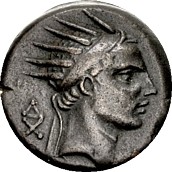![]()
Fleshing
Out Jesus, conclusion
Click
here to return to Part 1.
|
In Part 1, set in Rome in 62 AD, Theophilus and Luke heard Mark propose writing an allegory about a wise rabbi. The purpose of his fiction would be to popularize the doctrines of the apostle Paul. |
The Name of Jesus
“So, Mark,” inquired Luke, “what would you call your hero?”
“Jesus, I suppose. Paul calls him Christ Jesus. I’ve been meaning to ask you, Paul; where did that name come from, anyway?”
“There have been several preachers named Jesus,” the apostle replied. “It’s a common enough name. The Lord himself revealed it to me in that vision on the road to Damascus. ‘I am Jesus,’ the voice said. I told you about that.”
I needed clarification. “Do I understand that in your story, Mark, this Jesus will not be a voice from heaven but an actual person? Maybe Jesus could be an anointed priest, offering sacrifices to God as required by the law.”
“No,” Luke said, “I've read in a letter to the Hebrews that ‘if he had been on earth, he would not be a priest, since there are already those who offer the gifts.’” [Hebrews 8:4]
I had another idea. “Perhaps, Mark, you could make him one of those rabbis who teach in the Temple in Jerusalem.”
Mark demurred. “No, Theophilus, not in Jerusalem. I suppose as a Jew he’d have to visit there, but I think he should come from a more cosmopolitan area, like Galilee, where Jews and Gentiles live together. They call it ‘Galilee of the Nations.’” [Isaiah 9:1]
Paul Insists on the Cross
“You’ve got it all wrong!” Paul objected. “Our gospel is not about the teachings of any earthly rabbi in any earthly province. It’s about the divine sacrifice!
“First and foremost, Christ died for our sins. How did he die? It is written in the scriptures that the godless said, ‘Let us set a trap for the just man. Insult and torture are the way to put him to the test. Let us condemn him to a shameful death.’ [Wisdom of Solomon 2:12, 19-20] And what is the most humiliating and shameful death of all? Being nailed to a cross, like a common criminal! Therefore, Christ was nailed to a cross.”
I was reminded of some crucifixions in history. Two centuries ago, Antiochus IV Epiphanes punished a group of pious Jews by nailing them up, not as gruesome corpses but as still-living victims. “With bodies whipped and abused,” Josephus tells us, “they were crucified while still alive and breathing.”
|
|
“Antiochus was an evil ruler,” Mark agreed. “Anti-Ochus, ‘hostile to possessing.’ I think any opponent of our cause today should be named Anti-Christ, ‘hostile to the Lord.’” Paul noted that Anitochus took the cognomen Epiphanes, “God made manifest.” “He claimed to be divine, Zeus incarnate! Though born of mortal flesh, he thought he could command the waves of the sea. [2 Maccabees 9:8] What a delusion!” |
I recalled another famous mass execution only one century ago, when Alexander Jannaeus crucified 800 Pharisees in a single day.
Who Killed Jesus, and When?
|
“The cross,” said Mark, “is central to Paul's theology. And it can be the climax of my story. I’d give hints along the way, foreshadowing the end. [Mark 8:31] “I could set the final tragedy in the time of Alexander Jannaeus. Or maybe it could be more recent, like only about 30 years ago. That would make sense. People still remember that Pontius Pilate crucified many victims. In those days he was the Roman prefect of Judea.” |
|
The mention of an official of Rome reminded us that there was a soldier stationed outside our door. Luke asked Mark uneasily, “Would you then have Jesus executed by the Romans?”
“No!” exclaimed Paul. “It was the wicked angels who did it, the demonic powers who rule the world. If they had known God’s purpose, they would not have killed the Lord of glory.” [1 Corinthians 2:7-8]
Mark pointed out, “My story will be about events on earth, not in heaven.”
“I suppose,” Paul conceded, “if you have to invent a human agency, you could write that the Lord died at the instigation of the Jews in Jerusalem. They have always refused to recognize the truth.”
But Jesus Lived in Obscurity
“If Jesus truly was sent from God,” Luke mused, “he would have been able to perform miracles. He would have become famous as a powerful wonder-worker. Why was no biography ever written about him?”
“And even if Jesus wasn’t a celebrated magician,” I added, “his teaching would have attracted disciples. Why didn’t they realize he was the Messiah and tell everyone about it?”
Mark had a possible answer. He recalled the Greek god Dionysus, who disguised himself as a human. And then there was another character, Homer’s Odysseus. Upon returning from the Trojan War, Odysseus had to avoid his enemies by concealing his identity. “It’s still a dangerous world, even today. I could write that Jesus did indeed perform miracles, healing people and so on, but I could also have him give strict orders to his followers not to reveal the Messianic secret until the proper time. [Mark 8:29-30] Some people, if they knew the Messiah was among them, might prove untrustworthy.”
The Unfaithful Disciple
“Cephas!” Paul snorted. “He’s an example of that. If Cephas becomes a character in your little drama, depict him as untrustworthy. He does preach about Christ, but he and I are no longer on the best of terms.”
|
|
I pulled a small icon from my cloak. “You two gentlemen seem to be friendly enough in this little picture I found. But most people refer to him as Peter. Why do you call him Cephas?” “That’s his Aramaic name. He’s the apostle to the Jews. Since my conversion I’ve been the apostle to the uncircumcised Gentiles, so I use my Greek name Paul. [Galatians 2:7-8] “We mustn’t discourage the Gentiles from joining us! [Acts 15:19] |
“At first Cephas agreed with me. He too had a vision from heaven, and afterwards he had no problem associating with uncircumcised people. He even ate with them. [Acts 11:1-18] But then some friends of James came to see us in Antioch. Cephas was afraid of what they might think, so he stopped having anything to do with Gentiles. What a coward! And the rest of the Jews went along with him. What a hypocrite!” [Galatians 2:11-14]
Mark Knew Him Too
Luke asked, “Mark, you’re acquainted with Peter, aren’t you? Didn’t you travel with him for a time?”
“I was his interpreter,” Mark answered. “I translated his Aramaic preaching into Latin and Greek as necessary. He used to call me his son.” [I Peter 5:13]
“Where did you meet him?”
“When he escaped from jail, the first place he ran to was my mother’s house.” [Acts 12:6-12]
“He’s a coward,” Paul reiterated. “They call him The Rock, but if his back was up against the wall, I bet he’d claim he’d never even heard of the Lord.”
Mark nodded. His creative mind was starting to work again. “I could illustrate that. I could write a scene where Peter denies knowing Jesus. For dramatic impact, his faithlessness could be pointed out by an innocent animal! Don’t laugh. In the scriptures, Balaam got scolded by his donkey.” [Numbers 22:21-34]
“Donkeys don’t talk nowadays,” I objected.
“But sometimes birds do,” Luke offered helpfully.
“And roosters crow,” added Mark. “I don’t know; it’s only a detail. I’ll work it out later.” [Mark 14:66-72]
|
Paul’s thoughts were still on his dispute with Peter. “Why would Cephas insist that our Gentile converts have to live like Jews? [Galatians 2:14] Can people really be so stupid? “I ask, how did we receive the spirit — by trying to keep the Jewish law, or by believing the message of the gospel? [Galatians 3:2-3] “If anyone preaches a gospel other than mine, he should be banned! [Galatians 1:8] Get that Satan out of here!” [Mark 8:33] |
|
Source Material: Scripture
Mark continued developing the story in his mind. It would not be necessary, he said, to invent everything from whole cloth. For example, he could use prophecies that foretold a Messiah. He’d simply string together some scenes in which those predictions come true, thus “proving” Jesus to be the promised one.
And he could adapt other ancient tales. “It is written,” Mark recalled, “that a man brought Elisha twenty barley loaves. Elisha asked his assistant to serve them to a hundred people. The assistant protested that it wouldn’t be enough, but Elisha insisted, ‘Give it to the people to eat, for this is the word of the Lord: They will eat and there will be some left over.’ And so it happened.” [2 Kings 4:42-44]
“The miracle,” Luke quoted a proverb, “is this: The more we share, the more we have.”
Mark continued, “I can write that Jesus also fed the people. I can even say that he performed the miracle twice. That way, I can include some symbolism about the gospel being revealed twice, first to the Jews and later to the Gentiles.
“The first time is in his own country, Jewish territory. [Mark 6:1] Five thousand men are fed with five loaves, like the five books of the Torah. And twelve baskets are filled with what remains, like the twelve tribes of Israel. [Mark 6:34-44]
“The second time is in the Decapolis. [Mark 7:31] Here there are four thousand people from the four corners of the world. Some are far from home, and Jesus doesn’t want to send them away hungry. So he distributes seven loaves, like the Seven Hills of Rome, and seven baskets are filled with the leftovers. [Mark 8:3-9]
Luke had a problem. “That may baffle your readers. Almost the same story twice in a row? They’ll call it a doublet, one episode described in two contradictory ways. Which was it? Five thousand, or four?”
“I can point out my secret meaning,” said Mark. “I’ll highlight the numerology. Jesus can say to his disciples afterward, ‘You have eyes; can’t you see? You have ears; can’t you hear? Have you forgotten? When I broke five loaves for five thousand people, how many baskets full of pieces did you pick up? Twelve, right? And how many when there were seven loaves for four thousand people? Seven! Do you still not understand?’” [Mark 8:18-21]
Source Material: Paul
Mark noted that he could derive some of his story from Paul’s own experiences. Jesus could begin his ministry after seeing the heavens open and hearing a voice from the sky. Then he could immediately go off into the desert. [Mark 1:10-12]
Later he could preach in many locations, traveling from one to another by boat. [Mark 1:38, 4:35-36] Galilee doesn't have an actual sea, only a lake eight miles wide, but Mark could refer to it as “the Sea of Galilee” in allusion to Paul’s long journeys by ship.
Quoting Isaiah, Paul once explained that God had always intended that the Jews should reject Christ. “God gave them a spirit of stupor, eyes that should not see and ears that should not hear, down to this very day.” [Romans 11:8] Now Mark suggested these words for Jesus: “To those on the outside, everything is said in parables, so that they may indeed see but not perceive and may indeed hear but not understand. Otherwise they might be converted and their sins forgiven.” Spreading the word to outsiders, converting them and forgiving their sins, obviously would not accord with God's divine plan. [Mark 4:11-12]
Paul had been listening to all this. He roused himself a little on his sickbed. “I must object,” he said, “to portraying Christ as performing miracles and imparting ‘wisdom.’
“Jews demand miraculous signs, but no sign shall be given to this generation. [Mark 8:12]
“And Greeks seek intellectual knowledge, but human wisdom can never compare with even the ‘folly’ of God. [I Corinthians 1:25]
“Instead, my preaching is Christ crucified — a stumbling block to the Jews, and sheer nonsense to the Gentiles. [1 Corinthians 1:22]
“What then about my gospel, Mark? The good news of the risen Jesus — how could your earthly Jesus proclaim it, not yet having been crucified? Would he quote the things I have written and spoken?”
“Not directly,” said Mark. “But he’d express the same ideas. Sometimes I might even have him use your exact words.
“For example, your opinions of the Jewish law can be brought to life by putting them in the mouth of my rabbi. You wrote we shouldn’t turn away Gentile converts who decline to observe the dietary laws. ‘Don’t undo God’s work for the sake of a plate of meat!’ [Romans 14:19-20]
“I can support that by having the earthly Jesus declare all foods clean. ‘Nothing that goes into a person from outside can defile him, because it does not go into his heart but into his stomach and passes out of the body altogether.’ [Mark 7:18-19]
“You, Paul, are first among the apostles, yet you say ‘Though I am no man’s slave, I have made myself a slave to all.’ [1 Corinthians 9:19]
“In my story, Jesus can use the same words to instruct his disciples: ‘Whoever wants to be first among you must be a slave to all.’ [Mark 10:43-44]
“You tell us, ‘We are God’s children, but we must share his sufferings if we are also to share his glory.’ [Romans 8:16-17]
“Jesus can welcome the little ones. [Mark 9:42, 10:14] And he can proclaim, ‘If anyone wants to follow in my footsteps, he must give up all right to himself, take up his cross, and follow me.’ [Mark 8:34]
“You allow Gentile Christians to ignore the Sabbath. ‘One man thinks some days of more importance than others. Another man considers them all alike. Everyone must act on his own convictions.’ [Romans 14:5-6]
“Jesus can remark, ‘The Sabbath was made for man’s sake; man was not made for the sake of the Sabbath.’” [Mark 2:27]
Here Paul interrupted. “What I said is my own opinion! I had no direct instructions from the Lord.” [1 Corinthians 7:25]
Mark countered, “But the Lord did appear to you personally to explain the communal meal that we Christians share. Some say the Eucharist is a joyous feast to celebrate the resurrection. Not so. You revealed to us that it should be a solemn supper to commemorate the crucifixion.
“You wrote, ‘When you come together for this meal, you proclaim the Lord’s death until he comes. The tradition came to me personally from the Lord himself, and it was this: On the night he was delivered up, he took bread and broke it and said, This is my body which is being broken for you; do this in memory of me.’ [1 Corinthians 11:33, 23-26]
“So in my story, I can depict that scene when Jesus is ‘delivered up’ to death. Maybe he’s arrested at the dinner table, right after his metaphor about broken bread. For dramatic impact, perhaps it’s a Passover dinner. For irony, perhaps it’s an unfaithful disciple who calls in the authorities. As they drag Jesus off into the night, he looks back piteously and asks his disciples not to forget him. He’s about to be killed, he’ll never eat or drink again, but he wants them to remember his broken body whenever they dine together.” [Mark 14:22-25]
Paul grumbled but voiced no objection.
“Again, Paul, in your letters you urge us to be dutiful citizens and pay our taxes to the government. [Romans 13:1-7] Christians should always obey the worldly authorities, never try to resist them — no matter how oppressive they may be.
“I can have Jesus give the same advice. [Mark 12:17]
And you wrote, ‘The commandments are all summed up in the one rule, Love your neighbor as yourself.’ [Romans 13:9]
“Jesus can sum them up in the same way. ‘You must love your neighbor as yourself. No other commandment is greater.’” [Mark 12:31]
Let Us Consider Together
We all sat there for a while and pondered Mark’s proposal. I agreed that his allegory might be helpful in winning new converts. I told him that if he completed it, I would like to see a copy someday. Luke added that he too had a few ideas along these lines.
Paul also was thinking about the future, but that future involved his own mortality. “Nothing,” he began with a wheeze, then recovered his voice. “Nothing will daunt me or prevent me from speaking boldly. Now as always, Christ will display his greatness in me, whether my verdict be life or death.” Luke reached over to comfort him, but Paul continued, staring at the ceiling.
“To me, living means simply ‘Christ,’
and if I die I merely gain more of him.If I am to go on living in this world,
there is more work that needs to be done.But I long to leave this world and be with Christ.
That is better by far.”
|
He gazed at us. In the late afternoon light, he seemed to grow older before our eyes. “For your sake, the greater need is probably for me to stay here on earth. But whatever happens, make sure that your everyday life is worthy of the gospel of Christ.” [Philippians 1:20-27] Paul’s mind wandered. He thought again of those who had not proved worthy, the faithless Jews in Jerusalem, and he was moved to prophecy. |
|
“They have rejected the Gospel, and God will reject them! Isaiah was right; they are a disobedient and contrary people. [Romans 10:21] They’ll become full of themselves, stop cooperating with the worldly authorities, and foolishly revolt against Rome. When they do, their ‘holy city’ will be wiped out. As the Babylonians destroyed the first Temple, so will the Romans destroy the second. Not one stone will be left upon another. [Mark 13:2]
“But here in the wider world, we will continue spreading the good news of the gospel. We will do this by whatever means we can — even if our most effective evangelism turns out to be the promulgation of Mark’s pious fiction.”
|
I’ve paraphrased Bible verses from various translations, including the 1960 New Testament in Modern English by J.B. Phillips. In his 1975 book Did Jesus Exist?, G.A. Wells pointed out that Paul mentions almost no facts from the gospels — even when they would support his argument. For example, Paul apparently hasn’t heard about the Lord’s Prayer, for in Romans 8:26 he writes “We do not even know how we ought to pray.” Nor has he heard about such details as Nazareth, or Pontius Pilate, or miracles, or the Sermon on the Mount. Wells suggested that this is because the gospel stories had not yet been invented. That led me to wonder how Paul could have written about Jesus if there had been no Jesus. After 40 years, I’ve finally seen a possible explanation. Many insights have come from sources such as a lecture by Jonathan Rutherford. A.N. Wilson, who assumed that Jesus did exist, concluded in Paul: The Mind of the Apostle (1997) that the Jesus of the gospels “is in some senses the result of Paul. ...We can say that Paul, and not Jesus, was — if any one was — the ‘Founder of Christianity.’” |
|
Natalie Portman in Time magazine discussing her movie Jackie, on Jacqueline Kennedy Onassis's enduring image: "It has nothing to do with what actually happened. The story that lasts is the best myth. She came up with something that lasted. Whoever comes up with the best fairy tale wins." |
Click
here to return to Part 1.
Click here for other Bible stories I've retold in the first person.




